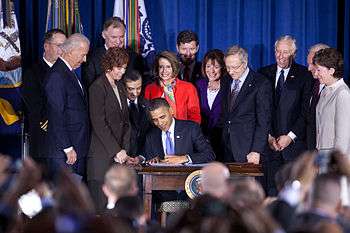Don't Ask, Don't Tell Repeal Act of 2010
.svg.png) | |
| Enacted by | the 111th United States Congress |
|---|---|
| Effective | September 20, 2011 |
| Citations | |
| Public law | 111–321 |
| Statutes at Large | 124 Stat. 3515, 3516 and 3517 |
| Legislative history | |
| |
The Don't Ask, Don't Tell Repeal Act of 2010 (H.R. 2965, S. 4023) is a landmark United States federal statute enacted in December 2010 that established a process for ending the Don't ask, don't tell (DADT) policy (10 U.S.C. § 654), thus allowing gays, lesbians, and bisexuals to serve openly in the United States Armed Forces. It ended the policy in place since 1993 that allowed them to serve only if they kept their sexual orientation secret and the military did not learn of their sexual orientation.
The Act established a process for ending the "Don't ask, don't tell" policy. According to the Congressional Research Service, the Act:[3]
Provided for repeal of the current Department of Defense (DOD) policy concerning homosexuality in the Armed Forces, to be effective 60 days after the Secretary of Defense has received DOD's comprehensive review on the implementation of such repeal, and the President, Secretary, and Chairman of the Joint Chiefs of Staff (JCS) certify to the congressional defense committees that they have considered the report and proposed plan of action, that DOD has prepared the necessary policies and regulations to exercise the discretion provided by such repeal, and that implementation of such policies and regulations is consistent with the standards of military readiness and effectiveness, unit cohesion, and military recruiting and retention.
The Act did not ban discrimination on the basis of sexual orientation in the military, as provided for in the proposed Military Readiness Enhancement Act.
President Barack Obama, Defense Secretary Leon Panetta, and Chairman of the Joint Chiefs of Staff Admiral Mike Mullen provided the certification required by the Act to Congress on July 22, 2011. Implementation of repeal was completed 60 days later, so that DADT was no longer policy as of September 20, 2011.
Background
DADT was controversial from the time it was implemented, but it became increasingly a matter of public debate after 2004. In July 2004 the American Psychological Association issued a statement that "Empirical evidence fails to show that sexual orientation is germane to any aspect of military effectiveness including unit cohesion, morale, recruitment and retention."[4] In February 2005, the Government Accountability Office reported that DADT cost at least $95.4 million for recruiting and at least $95.1 million for training replacements for the 9,488 troops discharged from 1994 through 2003.[5] In December 2006, Zogby International reported that a poll of military personnel conducted in October 2006 found that 26% favored allowing gays and lesbians to serve openly in the military, 37% were opposed, while 37% expressed no preference or were unsure.[6] At a February 2, 2010 congressional hearing, Senator John McCain read from a letter signed by "over one thousand former general and flag officers". It said: "We firmly believe that this law, which Congress passed to protect good order, discipline and morale in the unique environment of the armed forces, deserves continued support."[7]
Legislative history
The Democratic leadership in both the House and Senate tried to end the "don't ask, don't tell" policy with an amendment to the Defense Authorization bill. On May 27, 2010, on a 234–194 vote,[8] the U.S. House of Representatives approved the Murphy amendment[9] to the National Defense Authorization Act for Fiscal Year 2011. It provided for repeal of the DADT policy and created a process for lifting the policy, including a U.S. Department of Defense study and certification by key officials that the change in policy would not harm military effectiveness, followed by a waiting period of 60 days.[10][11] On the same day the U.S. Senate Armed Services Committee on a 16–12 vote advanced an identical measure to be included in the Defense Authorization Act.[10] The amended defense bill passed the House on May 28, 2010.[12] On September 21, 2010, John McCain led a successful (56 in favor, 43 opposed) filibuster against the debate on the Defense Authorization Act.[13]

On November 30, 2010, the Department of Defense's Comprehensive Review Working Group (CRWG) on DADT repeal issued its formal report outlining a path to the implementation of repeal of DADT.[14] The report indicated that there was low risk of service disruptions because of repeal of the ban.[15] Gates encouraged Congress to act quickly to repeal the law so that the military could carefully adjust rather than face a court decision requiring it to lift the policy immediately.[15] The United States Senate held two days of hearings on December 2 and 3, 2010, to consider the CRWG report. Defense Secretary Robert Gates, Joint Chiefs Chairman Michael Mullen urged immediate repeal. The heads of the Marine Corps, Army, and Navy all advised against immediate repeal and expressed varied views on its eventual repeal.[16]
Democrats in Congress quickly scheduled hearings to consider repeal of the law.[17] On December 3, the Joint Chiefs of Staff appeared before the Senate Armed Services Committee to testify about repeal.[18] While the Vice Chairman of the Joint Chiefs of Staff, Chief of Naval Operations, and Commandant of the Coast Guard said repeal would cause minimal disruption, heads of the Army, Air Force, and Marines opposed repeal because it would cause additional stress on combat focused forces during war.[18]
On December 9, 2010, another filibuster prevented debate on the Defense Authorization Act during the lame duck session of Congress.[19]
On December 9, 2010, in reaction to the failure to open discussion on the Defense Authorization Act, Senators Joe Lieberman and Susan Collins introduced a bill that included the policy-related portions of the Defense Authorization Act that they considered more likely to pass as a stand-alone bill. The Washington Post compared it to a Hail Mary pass.[20][21] The stand-alone bill was sponsored by Patrick Murphy and passed the House on a vote of 250 to 175 on December 15, 2010.[22][23]

On December 18, 2010, the Senate voted to end debate on its version of the bill by a cloture vote of 63–33.[24] Prior to the vote, Sen. Lieberman gave the final argument in favor of repealing DADT and Sen. McCain argued against repeal. The final Senate vote was held later that same day, with the measure passing by a vote of 65–31.[25]
U.S. Secretary of Defense Robert Gates released a statement following the vote indicating that the planning for implementation of a policy repeal would begin right away, led by Under Secretary of Defense for Personnel and Readiness Clifford L. Stanley, and would continue until Gates certified that conditions were met for orderly repeal of the policy.[26] President Barack Obama signed the bill into law on December 22, 2010.[1][2]
Senate roll call


Implementation
Following enactment, the Department of Defense charged a committee led by Clifford Stanley to oversee its implementation. Stanley's committee commissioned a comprehensive review of current policies, the repeal, and whether the new status quo would be consistent with the goals of, in the words of Secretary of Defense Robert Gates, "military readiness, military effectiveness, unit cohesion, and recruiting and retention of the Armed Forces."[29] On January 29, 2011, the Pentagon released its plan for implementing the end of DADT. It called for a three-month period of training for all personnel, beginning in the third quarter of 2011. President Obama, Defense Secretary Leon Panetta, and Joint Chiefs of Staff Chairman Adm. Mike Mullen sent Congress the required certification that implementation of repeal would not have negative effect on military readiness and performance on July 22, 2011. Full implementation of the repeal occurred 60 days later on September 20, 2011.
The repeal of DADT did not alter the language of Article 125 of the Uniform Code of Military Justice, which banned sodomy by service members. This prohibition was removed upon enactment of the National Defense Authorization Act for Fiscal Year 2014.[30]
References
- 1 2 Wilgoren, Debbi; Backon, Perry Jr. (2010-12-22). "Obama to sign DADT repeal before big, emotional crowd". Washington Post. Retrieved 2010-12-22.
- 1 2 "Obama signs bill repealing 'don't ask, don't tell' policy". Los Angeles Times. Associated Press. 2010-12-22. Retrieved 2010-12-22.
- ↑ "H.R.2965 - Dont Ask, Dont Tell Repeal Act of 2010". OpenCongress.org. Archived from the original on 2012-09-08. Retrieved 2010-12-18.
- ↑ American Psychological Association: Proceedings of the American Psychological Association for the legislative year 2004. Minutes of the meeting of the Council of Representatives July 28 & 30, 2004, Honolulu, Hawaii, accessed March 5, 2012
- ↑ "Report: 'Don't Ask, Don't Tell' costs $363M". USA Today. February 14, 2006. Retrieved March 14, 2012.
- ↑ "Opinions of Military Personnel on Sexual Minorities in the Military" (PDF). 2006. Archived from the original (PDF) on 2011-03-01. Retrieved October 13, 2010.
- ↑ Joint Chiefs of Staff: "Testimony Regarding DoD 'Dont Ask, Dont Tell' Policy," February 22, 2010 Archived January 30, 2012, at the Wayback Machine., accessed February 19, 2012
- ↑ "Final vote results for roll call 317". Clerk.house.gov. May 27, 2010. Retrieved December 19, 2010.
- ↑ Allen, Jared; Tiron, Roxana (May 25, 2010). "GOP to defend 'Don't ask, Don't Tell'". The Hill. Retrieved May 30, 2010.
- 1 2 Fritze, John (May 27, 2010). "Congress advances repeal of 'don't ask, don't tell'". USA Today. Retrieved May 27, 2010.
- ↑ Herszenhorn, David M.; Hulse, Carl (May 27, 2010). "House Votes to Allow Repeal of 'Don't Ask, Don't Tell' Law". The New York Times. Retrieved May 28, 2010.
- ↑ "House Passes 'Don't Ask, Don't Tell' Bill". CBS. May 28, 2010. Archived from the original on July 21, 2010. Retrieved May 28, 2010.
- ↑ "Senate halts 'don't ask, don't tell' repeal". CNN. September 22, 2010.
- ↑ Department of Defense: "Report of the Comprehensive Review of the Issues Associated with a Repeal of 'Don't Ask, Don't Tell'," November 30, 2010 Archived January 13, 2012, at the Wayback Machine., accessed January 30, 2012; comprehensive report
- 1 2 Bumiller, Elisabeth (November 30, 2010). "Little Impact Seen if Military Gay Ban Is Repealed". The New York Times. Retrieved December 1, 2010.
- ↑ New York Times: Elisabeth Bumiller, "Service Chiefs Tell Panel of Risks to 'Don't Ask, Don't Tell' Repeal," December 3, 2010, accessed January 30, 2011
- ↑ O'Keefe, Ed; Whitlock, Craig (November 30, 2010). "'Don't ask, don't tell' report: Little risk to allowing gays to serve openly". Washington Post. Retrieved December 1, 2010.
- 1 2 "Top generals buck White House on military gay ban". MSNBC. December 3, 2010. Retrieved December 6, 2010.
- ↑ O'Keefe, Ed; Kane, Paul (December 9, 2010). "'Don't ask, don't tell' procedural vote fails". The Washington Post. Retrieved December 10, 2010. Crossing party lines, Sen. Susan Collins of Maine voted in favor of cloture on the bill and Sen Joe Manchin of West Virginia voted against cloture. Manchin stated that he did not support cloture because he had not yet consulted constituents on the issue, but said that the policy "probably should be repealed in the near future". D'Aprile, Shane (December 9, 2010). "Manchin votes against 'Don't ask' repeal, then apologizes". The Hill. Retrieved December 10, 2010.
- ↑ O'Keefe, Ed; Whitlock, Craig (December 11, 2010). "New bill introduced to end 'don't ask, don't tell'". The Washington Post. Retrieved December 13, 2010.
- ↑ "S. 4022". Hdl.loc.gov. December 9, 2010. Retrieved December 19, 2010.
- ↑ "Final vote results for roll call 638". Clerk.house.gov. December 15, 2010. Retrieved December 19, 2010.
- ↑ "Bill Summary & Status – 111th Congress (2009–2010) – H.R.6520". Hdl.loc.gov. June 19, 2009. Retrieved December 19, 2010.
- ↑ "U.S. Senate Roll Call", U.S. Senate, December 18, 2010. Retrieved December 18, 2010.
- ↑ Hulse, Carl (December 18, 2010). "Senate Repeals 'Don't Ask, Don't Tell'". The New York Times. Retrieved December 18, 2010.
- ↑ "Statement by Secretary Robert Gates on Senate Vote to Repeal 'Don't Ask, Don't Tell'" (Press release). United States Department of Defense. December 18, 2010. Archived from the original on December 24, 2010. Retrieved December 19, 2010.
- ↑ Roll call vote 279, via Senate.gov
- ↑ Roll call vote 281, via Senate.gov
- ↑ Miles, Donna (December 18, 2010). "'Don't Ask' Remains in Effect as Gates, Mullen Tackle Plan". United States Department of Defense. American Forces Press Service.
- ↑ Vergun, David (January 8, 2014). "New Law Brings Changes to Uniform Code of Military Justice". United States Department of Defense. Army News Service.
External links
- Bill Summary & Status - 111th Congress (2009 - 2010) - H.R.2965
- In Historic Move, Senate Votes to Repeal "Don’t Ask, Don’t Tell" - video report by Democracy Now!
- Invocation delivered at Presidential Signing Ceremony for DADT Repeal, December 22, 2010.
- Rhode Island College LibGuide - Don't Ask, Don't Tell Repeal